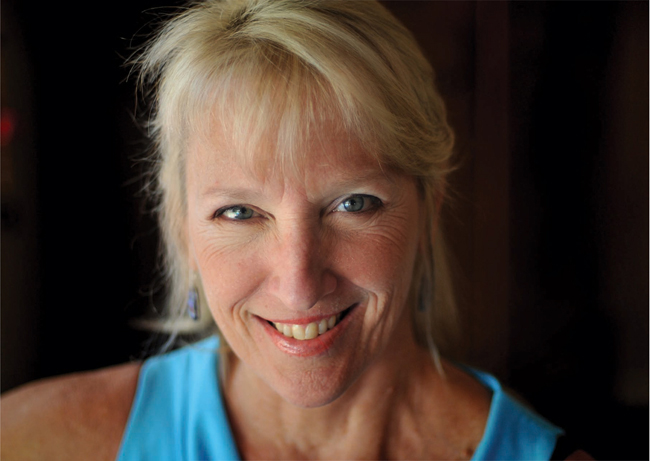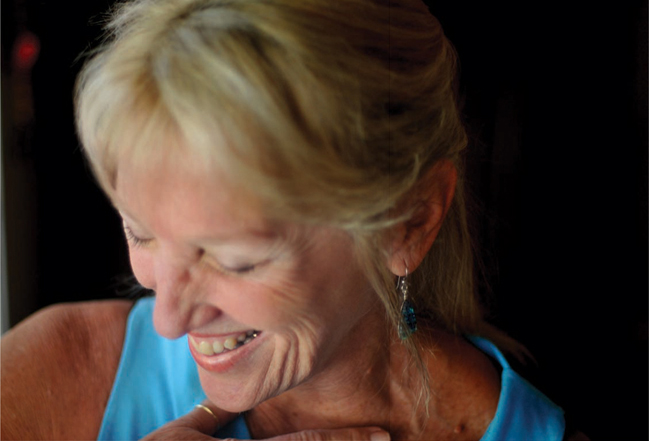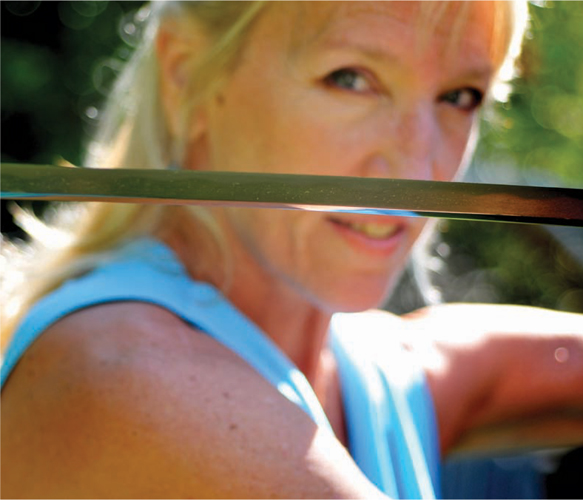
I don’t remember how old I was the first time I heard my mom lie about her age. I was young, though — very young — seven, maybe? Eight? In any event, I came home from school, proudly telling her that I had informed my classmates how old she was. She looked at me in horror.
“Karen, you must never tell your friends my age,” she said.
“Why not?”
She looked flustered. “You just don’t. And if they insist, you tell them I’m twenty-nine.”
“But…” I was confused. “I thought you were thir — …”
“Just tell them I’m twenty-nine,” she insisted. And then, more wistfully: “Twenty-nine was a wonderful age …” she murmured, and she walked away in reverie.
Even then, I thought lying about your age was quite possibly the craziest thing I’d ever heard. I mean, from my perspective, I couldn’t wait to get older — why in heaven’s name would you ever try to make yourself seem younger?
For the most part, I’ve continued to believe this my whole life; I’ve never shied away from telling people my true age, nor have I ever greeted my birthday with anything but happiness. Yet, as time passed — and gray hairs started to appear, body parts became softer and more dimply, and my backside began its slow march down the back of my legs — I began to see my mother’s point. I still don’t believe that lying about my age is going to fool anybody; yet, if I sit and think about it, there’s no escaping the truth: sometimes, aging isn’t fun.
But whenever I do find myself sitting and thinking about it, before long my mind invariably turns to my friend Pam, a woman who flat-out defies age. It’s not just that she looks great for her fifty-seven years — although, Sweet Pete, she really does look fifteen years younger — it’s that she seems to be completely oblivious to any of what it stereotypically means to get older. She doesn’t just look or act young, she is young. In fact, she is quite possibly the youngest person I know. And since I’m the mother of a kindergartener, that’s really saying something.
I met Pam many years ago at the end of my first marriage. I was in my mid-twenties, and she was my new next door neighbor in the wooded apartment complex where I had moved exactly 50% of the stuff from my previous home. It was a pretty stressful time for me: it was the first time I was living on my own as an adult, I was dealing with a divorce, and I was just beginning my legal career. I was as unhappy as I’d ever been, so having a kind neighbor with a soulful smile and eyes that danced with fun was exactly the sort of tonic I needed.
I soon learned Pam was a very spiritual person — she was well-versed in Eastern philosophies and religions — and she had the most diverse set of hobbies of anyone I’d ever known. While most of my friends and I spent our spare time lifting weights at the gym, Pam was doing standing meditation or slow Eastern Martial Arts sword practice on the sidewalk outside of our homes. While I ran incessant circles around the track at our city park, Pam took flamenco lessons. When I escaped to relaxing vacations spent idly on a beach, Pam visited coastlines with huge swells so she could tackle them with her surfboard.
I may have been younger than Pam, but the truth was that she was the kid.
Several times over the years, I’ve asked Pam how it was that she never seemed to age. “Why age?” she would look at me with mild distaste. “I’ve never stopped liking to play and have fun. In fact, I won’t ever stop liking to play and have fun.”
Pam comes by her thoughts on aging honestly: her parents were (and still are) the same way. “I remember, growing up, Friday night was always Party Night,” she told. “They threw these really great parties. And when my brother and I were teenagers, my parents would sneak out to the lifeguard stand on the beach to make out.” She rolled her eyes at the memory, and began to giggle. “Friends would go, ‘Urn, Pam? Are those your parents…?’”
Pam spent most of her childhood in Hollywood, Florida. The daughter of a crime scene investigator and a buyer for a record company, Pam spent her youth surfing up and down the northern Florida coast. She was bitten by the travel bug when she was in high school. “I always wanted to be in the travel industry,” she says. Her dream was to surf the big swells of Hawaii — and when she was twenty-three years old, she bought herself a one-way ticket to live her dream.
“Wait, you just left? Did you have a job? Plans?”
She laughed. “Nope. I sold everything, and went. I just knew that Hawaii was where I was supposed to be and trusted that it was all going to work out.”
“Well, I landed in Maui, got my bags and got in a cab. The cabbie asked me where I wanted to go. I didn’t have any idea, so I told him I was looking for suggestions. He suggested the Pioneer Inn, which was this old whaling hotel on the other side of the island. I said, ‘That works!’
“The drive to the hotel took about an hour, and so the cabbie and I started talking, and he asked what I was going to do while I was in Hawaii. I told him that I didn’t know and would be looking for work. After the end of the hour’s drive, he spoke to his wife, and they offered me a job to babysit their little boy. For three months, I lived with this guy’s family, taking care of his son and surfing on my time off. It was great.”
Eventually Pam moved to the Big Island of Hawaii, where she got her first job as a travel agent. “My first job was heaven: I was in a beautiful environment, helping people have their best possible vacation. I wore shorts and rode my bike to work, carrying my surfboard with me! During lunch I would surf, then shower off and go back to work, totally invigorated.” She worked for several years on the Big Island, before feeling the call of the mainland again —which is how she eventually found herself in Houston and as my next door neighbor.
One day Pam was sitting on my living room sofa, drinking tea, looking as radiant as ever. “Pam,” I said, “do you ever think about your age? Getting older?”
“No, never,” she responded. “I remember once when I was a kid, my mom was in the bathroom looking at herself in the mirror. She was about thirty-three at that time, and I remember her saying — without any regret or remorse, just telling me matter-of-factly — she said, ‘Babe, don’t ever get old.’ I took it to heart. And so I’ve never really focused on age — I sort of see myself as whatever age I need to be to do whatever it is I want to do.
“I think there are really three ages that everyone has,” she continued. “There’s your chronological age, which is of course, the number of years you’ve been on this Earth. Then there’s your physiological age — sort of the age that your body feels — but then there’s your psychological age. That’s the age that you feel. And I figure my psychological age is about fifteen,” she grinned.
“Okay, but let’s just talk about that physiological age,” I said, not willing to give up that easy. “A few years ago, you had hip replacement surgery, right?”
“Yeeessss,” she said, looking at me quizzically.
“Well? Didn’t that make you feel like you were aging or getting older?”
Pam looked at me, genuinely confused. “Oh. No. No, not at all,” she said. “I mean, I’ve danced since I was three-and-a-half years old — you know, ballet, and even flamenco. And I’ve surfed and always been really active. The reason that I had to have hip replacement surgery was because my hips were genetically predisposed to only withstand so much stress, and I’d been working them pretty hard. I don’t think it had anything to do with age …”
“You’re amazing, Pam,” I said. “I think most people would think of hip replacement surgery as a sign of getting older.”
“No, I really never thought about it that way,” she said. “For me, it was just general maintenance because of a genetic quirk.”
“And it’s never slowed you down from being active, has it?”
“No way,” she said emphatically. “You know, there’s this saying … what is it? … something like, ‘Do the things you fear, and the death of fear is certain.’ I love this. I think this is all part of staying young. Take travel, for instance,” she continued. “Traveling takes you out of what is familiar and forces you to embrace change as you experience different lifestyles, cultures and people. I think that openness to experience something new keeps us from being stagnant, dull, or … well, old.”
“I agree with you when it comes to travel,” I conceded, “but the concept of facing fear helping to keep you young … I don’t know. I think a lot of people would think that fear, or stress, or worry would actually age you …”
“Oh, stress and worry definitely ages you, but I really believe that facing fear results in growth and strength; it vitalizes. Like back in Hawaii, I faced my fears each and every time I hit the water to surf — sharks, hitting the reef, drowning, were all very real possibilities. I felt that knot in my stomach every time I entered the water. But then, as soon as the first wave washed over me, I was always compelled to say, ‘Oh, thank you God.’ It was as if the wave washed away any problems, any worries. And then when I finally hit the beach at the end of the session, I was thrilled … thrilled with myself for doing it in the first place, thrilled with the beauty of nature.
“These days, I don’t surf very often, but my ‘ocean’ is my Harley. It’s a lot like surfing actually: I still get that ‘knot,’ or awareness of the danger of riding each time before I get on the bike. I say my prayer for protection from harm or injury, and by the time I’m hitting second gear, the wind is blowing my hair, and I’m saying, ‘Oh, thank you, God.’ And then, when I pull my bike back into the garage, I give myself a sort of mental ‘high five,’ for defeating fear and going for the thrill, for pushing myself and my comfort zone.”
“You mentioned ‘God’ a few times there,” I smiled. “I know you’ve studied so much Eastern philosophy, so I was wondering: how much of your attitude about aging has been formed by that, do you think?”
“I’m Christian,” she said, “and have a very strong faith as a result; but yes, I’ve always been interested in Eastern philosophy. Regardless, however, I think I’ve mostly come to my outlook on getting older from my parents; I was raised by people who loved life and loved having fun. Still, there’s probably some truth to the idea that perhaps it has helped me have a healthy outlook on getting older — mostly because there’s the philosophy of mindfulness and living in the present that is really my core belief. I’m always about living in the now, living in the present — I mean, who knows if you’re going to live tomorrow, you know? I’m always living in the present, not looking back with regrets or guilt, or to the future with any anticipation or anxiety. I mean, I still plan and have dreams and goals, but the majority of my day is spent right here, right now. I just trust God that everything is going to be fine.”


After my friend left my house that day, I couldn’t help but sit and think about what she had said; it wasn’t the first time that I’d heard that “living in the present” was the cure to much unhappiness, but I hadn’t considered it when it comes to dealing with the prospect of getting older. It made sense somehow: by really appreciating the life I’m living, the life I have right now, enjoying the moment I’m spending steeping your tea, or making the bed, or even reading a book, it’s sort of hard to also concentrate on what life might or might not be when I’m older. At that moment, I made the commitment to myself to be more conscious of the goodness around me in the present as often as possible in my day-to-day life.
“Why age? I’ve never stopped liking to play and have fun. In fact, I won’t ever stop liking to play and have fun.”
And perhaps by doing so, the next time someone asks me how old I am, even though it would never dawn on me to lie about it, I’ll answer in a spirit of celebration.